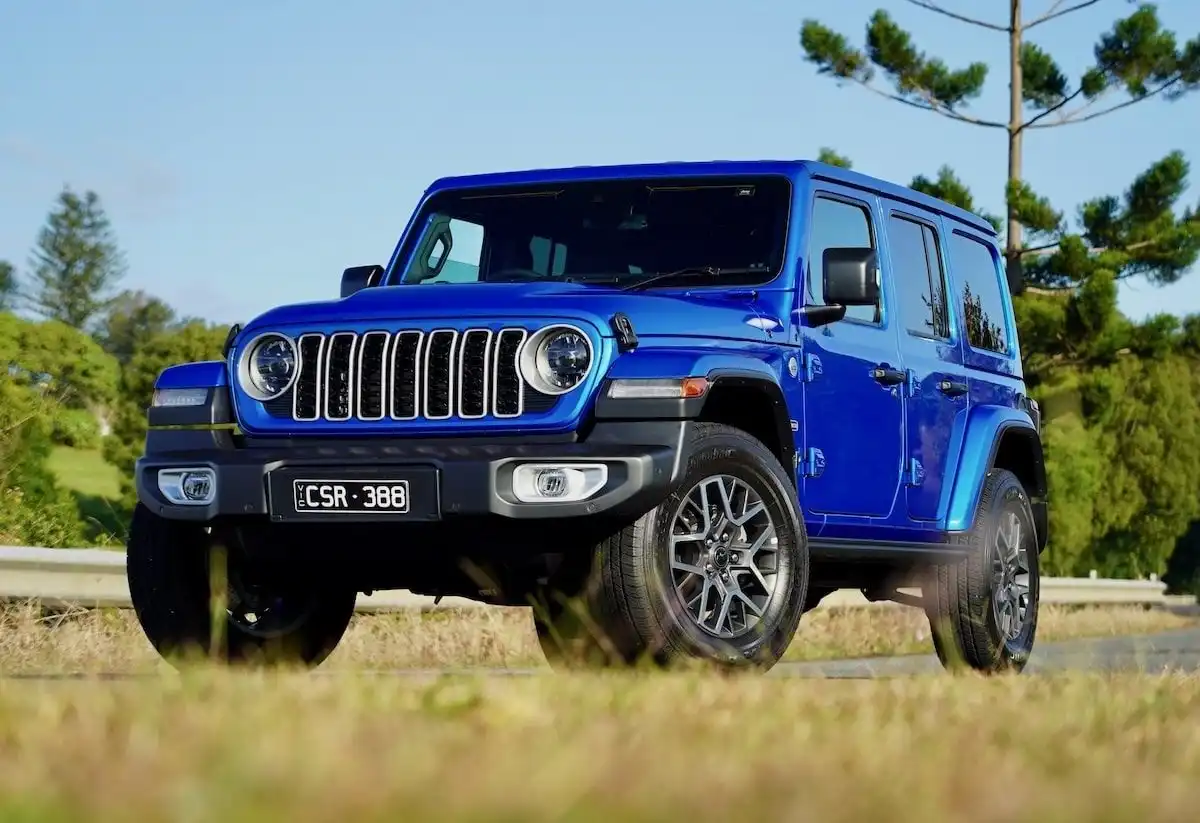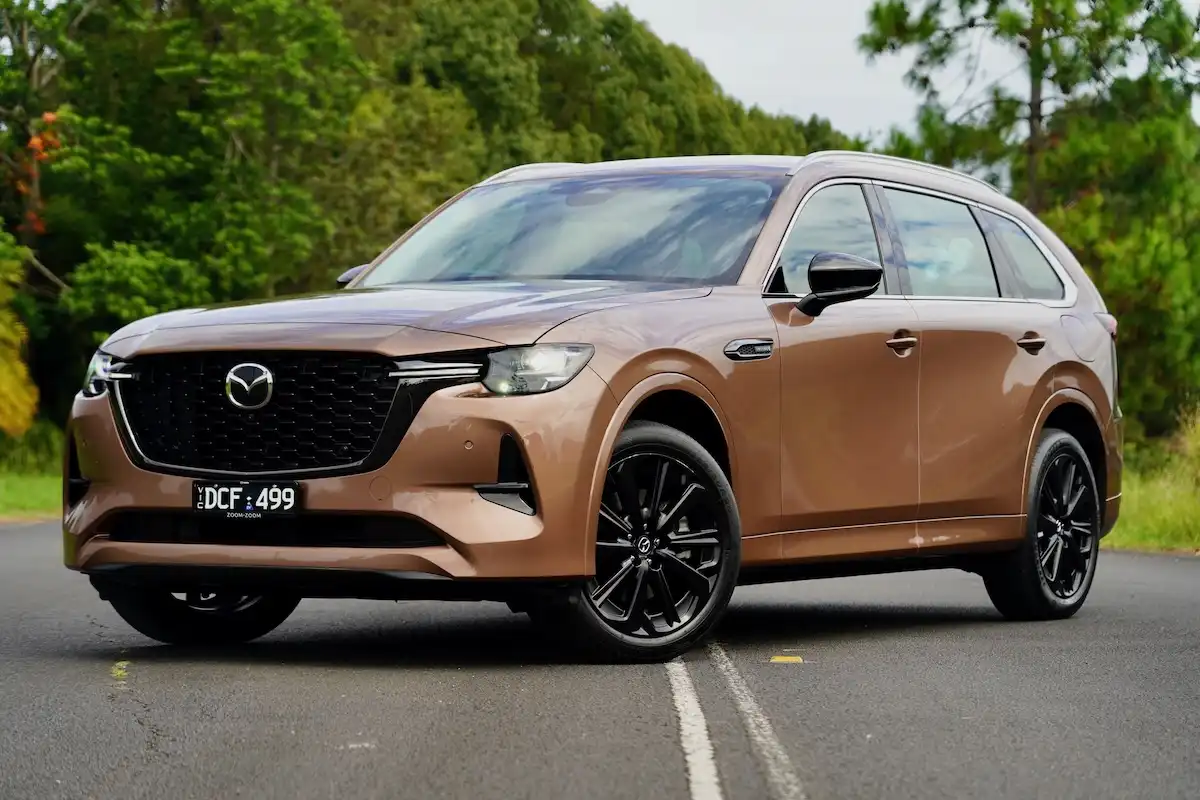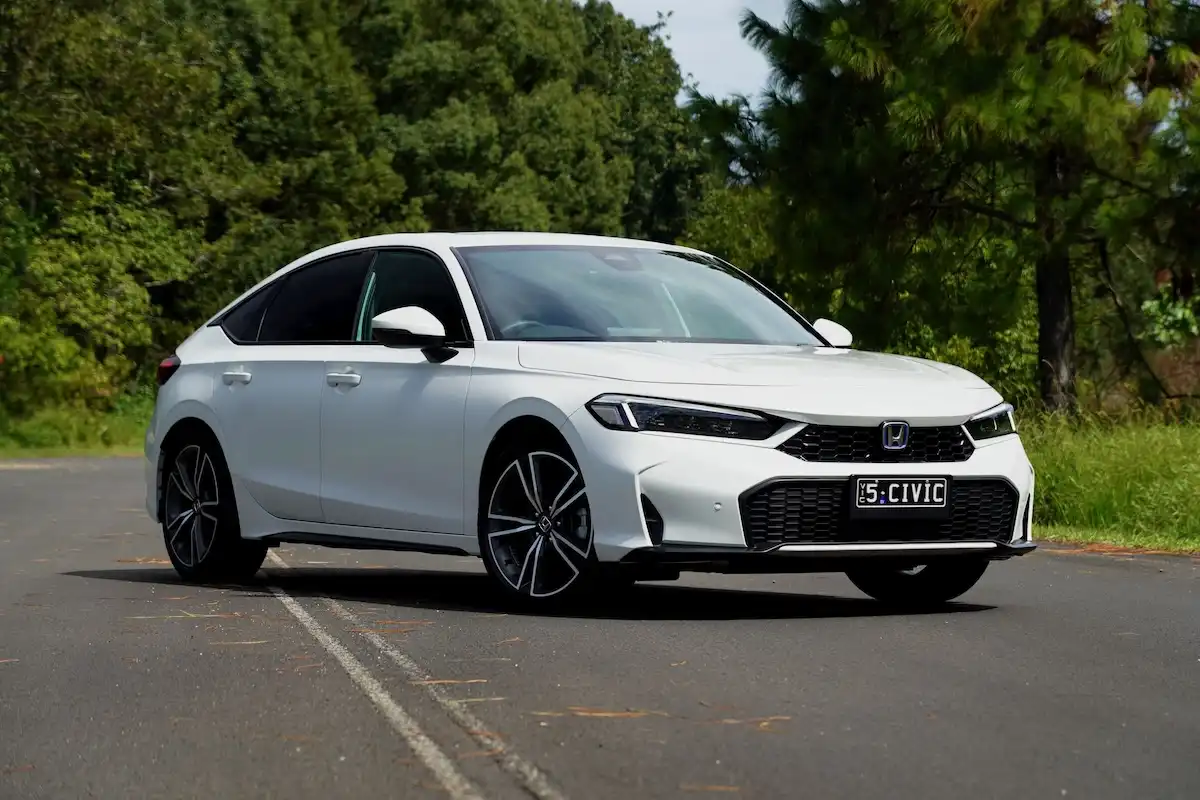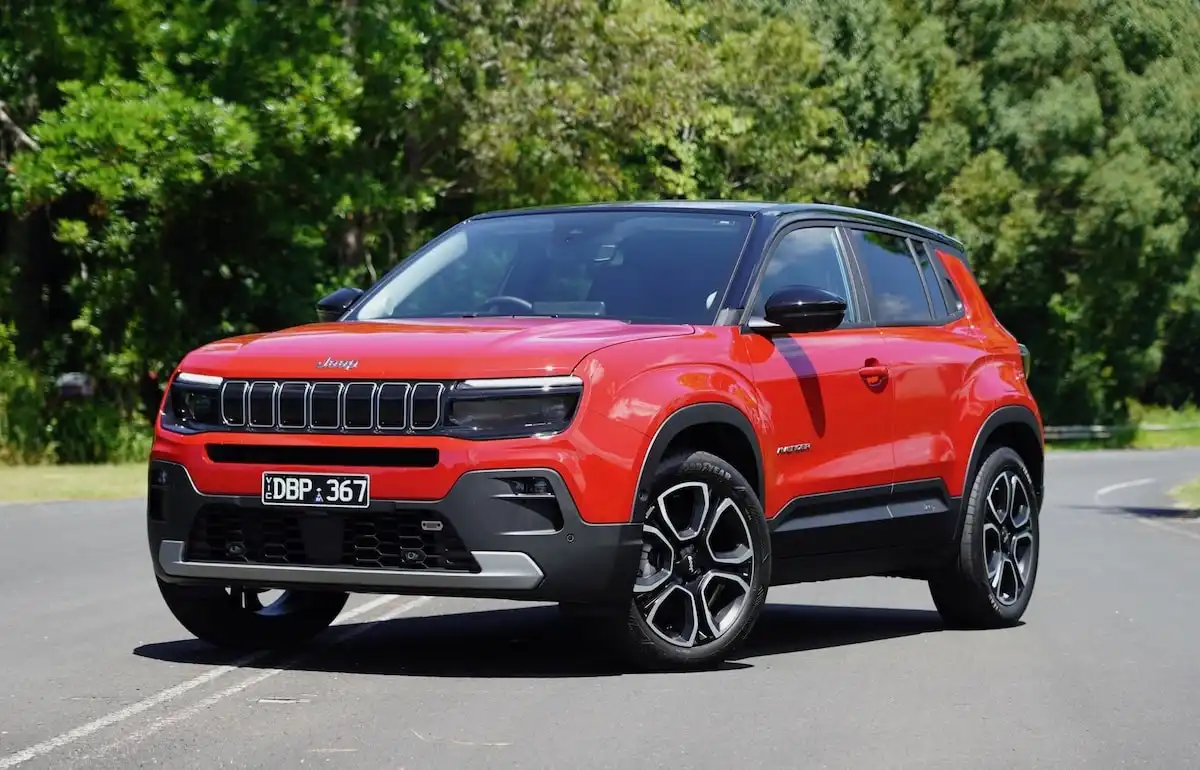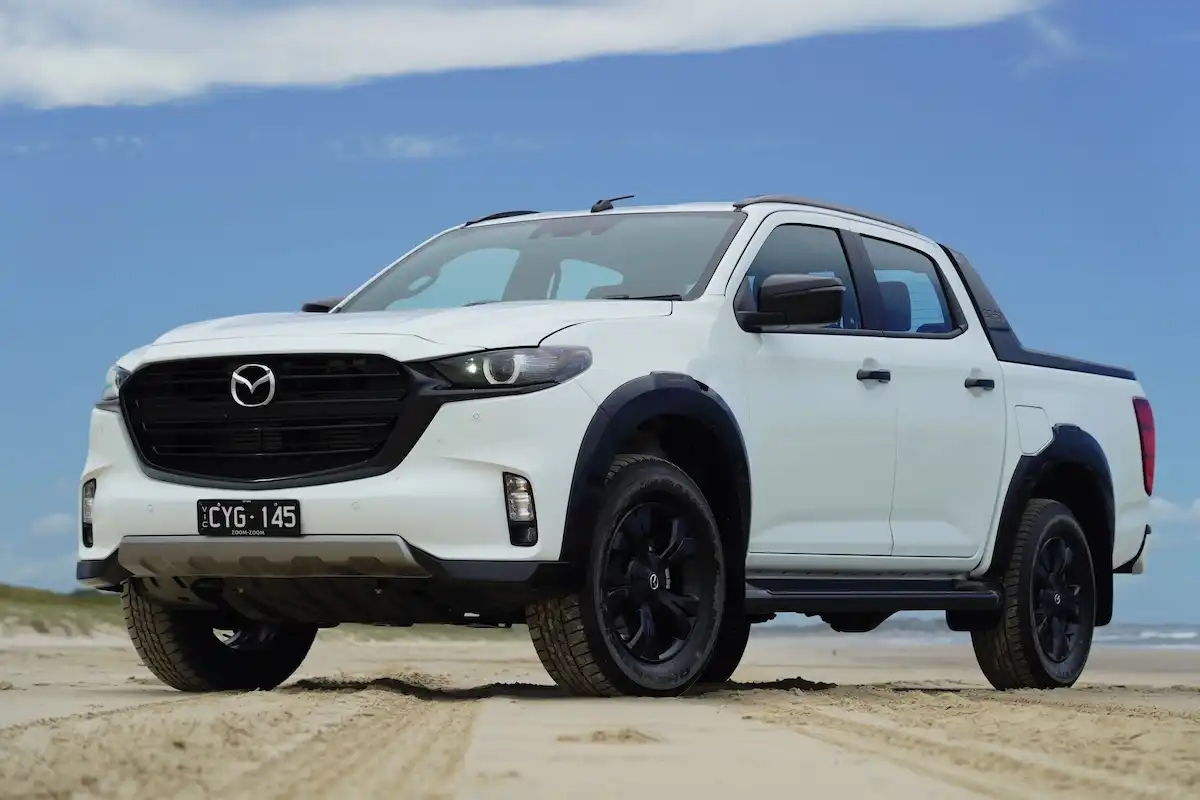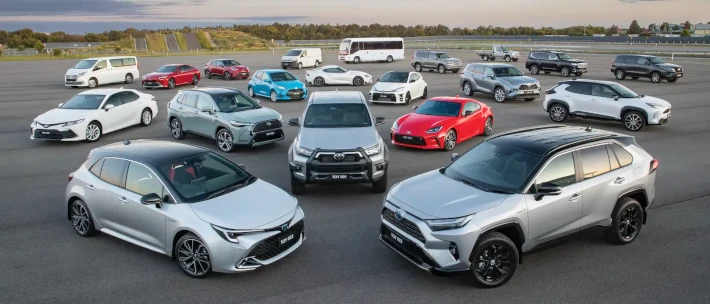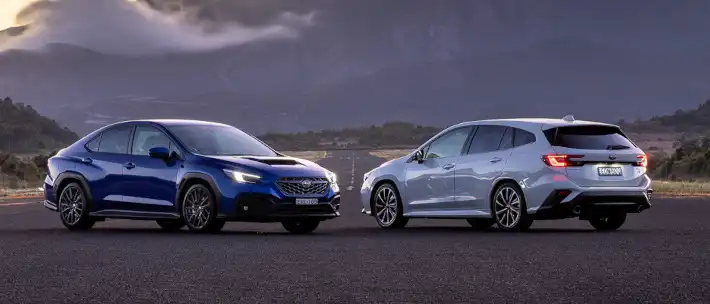It’s a vehicle that even non-enthusiasts know, with its unique boxy-styling and go-anywhere abilities making it a particularly attractive offering for adventurous buyers looking to stand out from the crowd.
Jeep’s Wrangler range enters 2024 with a long list of upgrades, including a brand-new engine, upgraded technology and a styling update, though these have been accompanied by price rises across the lineup.
How well have these upgrades helped to justify the recent price hikes, and how does the Jeep Wrangler handle a more mundane, everyday trip around town? We got behind the wheel of the mid-range Wrangler Overland to find out.
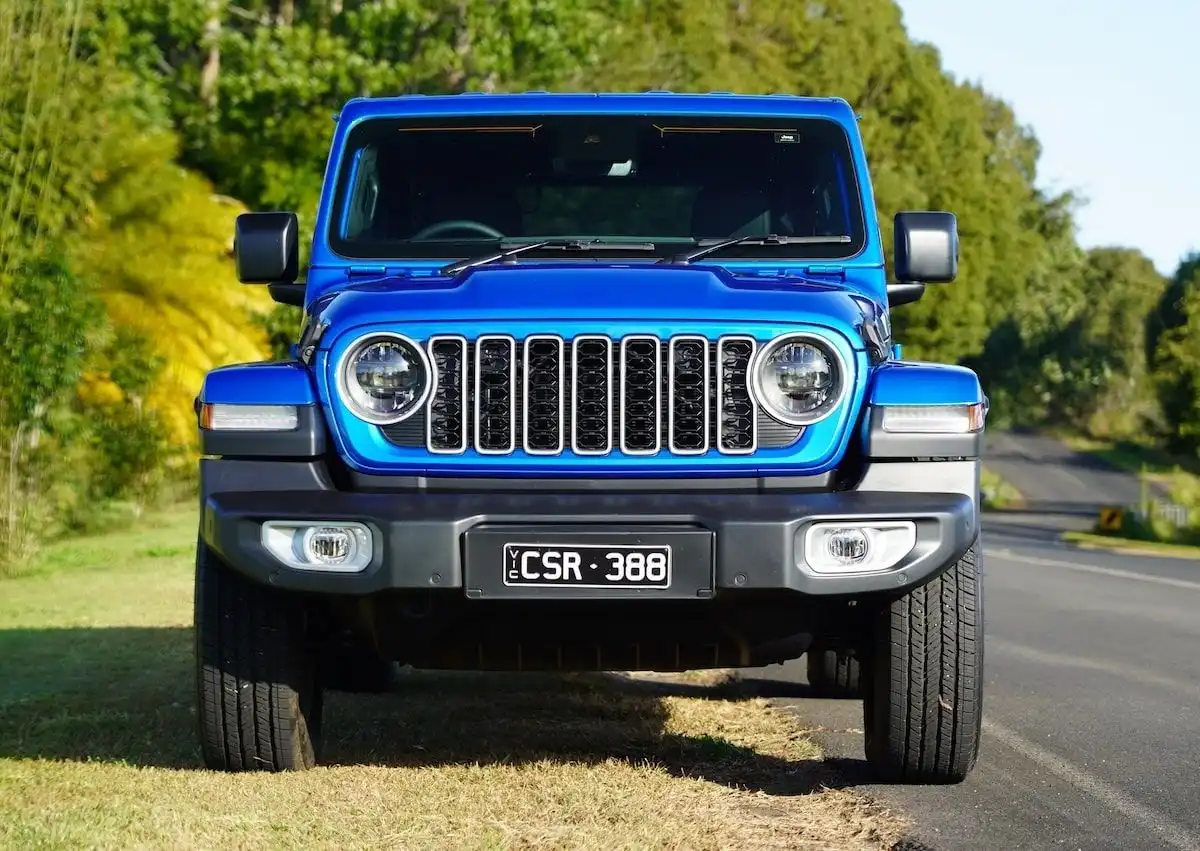
Jeep Wrangler Overland Competition
Jeep Wrangler Overland |
VS |
GWM Tank 300 |
| Isuzu MU-X | ||
| Toyota LandCruiser Prado | ||
| LDV D90 | ||
| Mitsubishi Pajero Sport | ||
| Mahindra Scorpio | ||
| Land Rover Defender | ||
| Suzuki Jimny |
Get in touch with one of our Car Buying Specialists today.
Request a quoteHow Much Does the Jeep Wrangler Overland Cost?
The 2024 Jeep Wrangler Unlimited Overland four-door you’re looking at here is priced at $83,950 before on-road costs are applied.
Prices for the rest of the Wrangler range can be found below.
-
Wrangler Unlimited Sport S: $75,950
-
Wrangler Unlimited Rubicon (Two Door) $82,950
-
Wrangler Unlimited Overland $83,950 (tested)
-
Wrangler Unlimited Rubicon (Four Door) $89,450
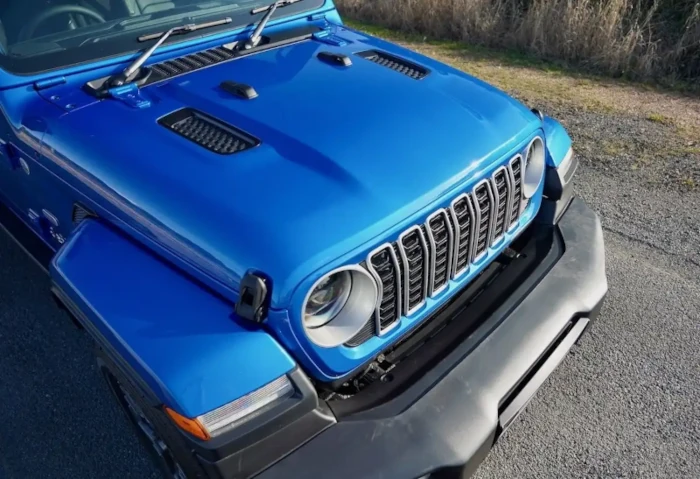
How Much Can OnlineAuto Save You?
You could save money by using one of OnlineAuto’s car agents to assist you in finding the best car for you. As one of the leading car buying services in Australia, our team have access to a range of dealerships across the country to help find you the best deal.
What Features & Specs Does the Jeep Wrangler Overland Have?
Features specific to the Jeep Wrangler Overland include a set of 18-inch alloys wrapped in Bridgestone Dueler highway-terrain tyres, an upgraded anti-spin Dana M220 rear axle, upgraded McKinley leather upholstery, 12-way power-adjustable front seats with lumbar support, a soft spare tyre cover, black mirrors and a hard seatback panel.
The Wrangler Overland also picks up entry-level Wrangler Sport S range features.
These features include a set of automatic LED headlights, adaptive cruise control, climate control, heated front seats and steering wheel, keyless entry & start, LED interior lighting, a rear-view camera with front & rear parking sensors and a Gorilla Glass windscreen.
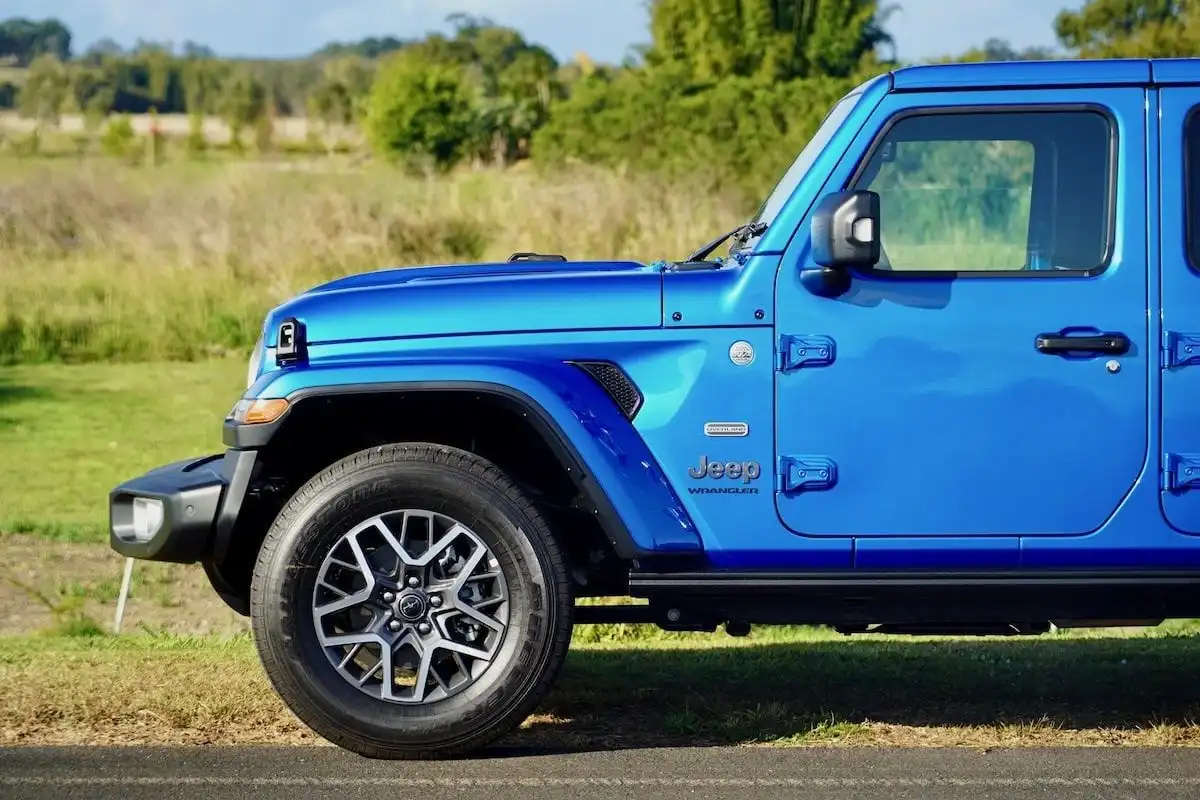
Jeep Wrangler Overland Infotainment Features
One area that the Jeep Wrangler certainly doesn’t disappoint is the central display, which has grown significantly over the previous 8.0-inch infotainment system.
Now, every member of the 2024 Wrangler range boasts the upgraded 12.3-inch display sitting proudly at the top of the dash, with Jeep’s latest-generation Uconnect 5 OS underneath.
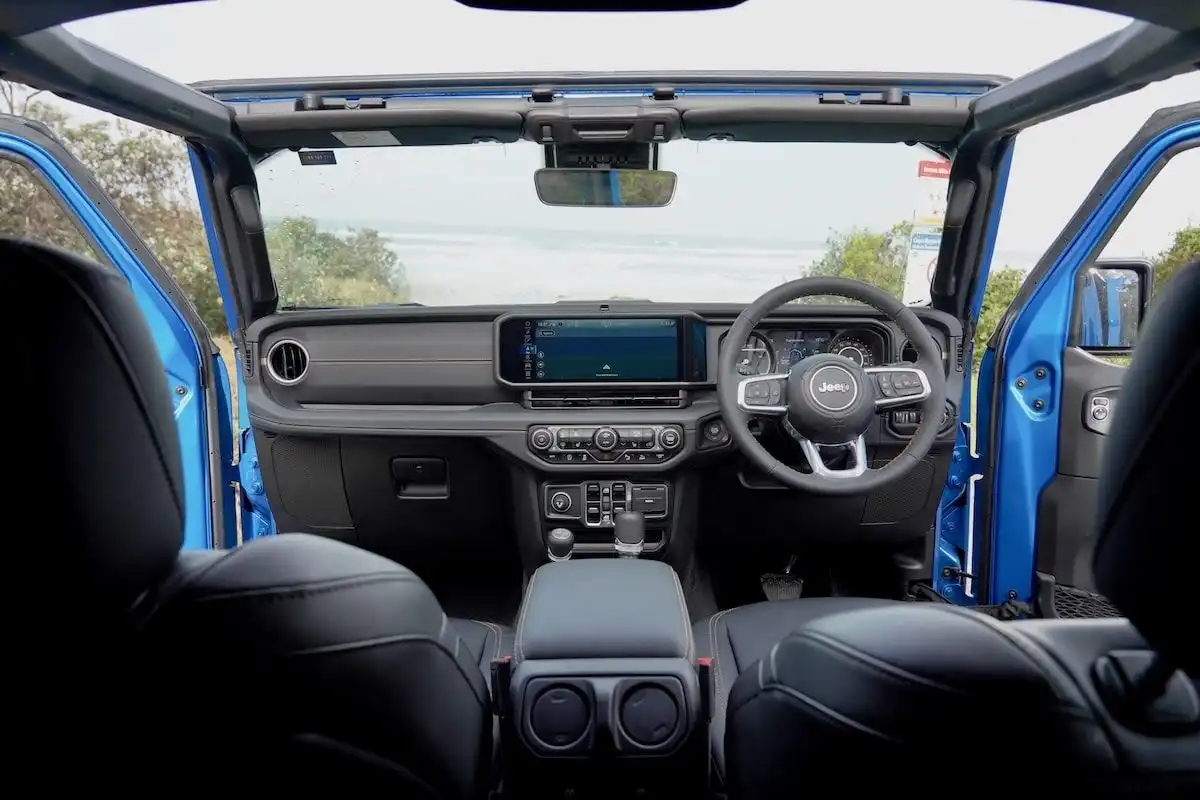
It’s a monumental upgrade from the previous unit and certainly helps to add a bit of modernity to the Wrangler’s traditionalist and utilitarian cabin, with DAB+ digital radio and satellite navigation bundled in for good measure.
Jeep’s menu layout isn’t the flashiest, but it is easy to navigate with shortcuts on the left-hand side of the display and offers some neat little off-road submenus to check out your pitch and roll while you’re on the trails.
All members of the Wrangler range also come packaged with a nine-speaker sound system courtesy of Alpine, which includes a massive subwoofer protruding from the right-hand side of the boot.
Does the Jeep Wrangler Have Wireless Apple CarPlay & Android Auto?
Jeep’s upgraded infotainment display and the underlying Uconnect 5 operating system have been updated with the latest smartphone mirroring tech.
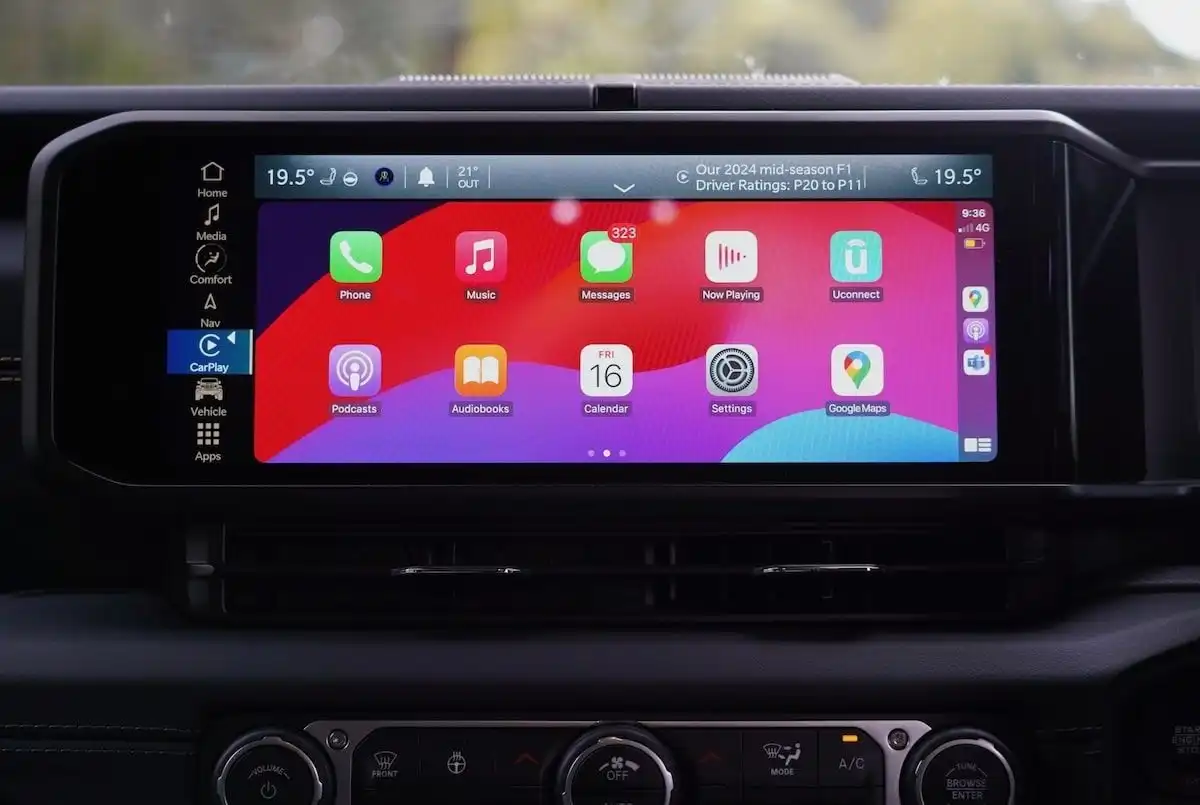
This means that every member of the Wrangler range, from the entry-level Sport S to the Overland and the flagship Rubicon receives wireless Apple CarPlay & Android Auto connectivity.
Paring your phone wirelessly with the Wrangler’s infotainment system is a simple process and we did not experience any drop-outs in the connection while utilising Apple CarPlay.
Is the Jeep Wrangler Overland Comfortable to Drive?
The Jeep Wrangler can’t hide its off-road upbringing when it comes to driving on sealed roads - though it has come a long way over recent generations.
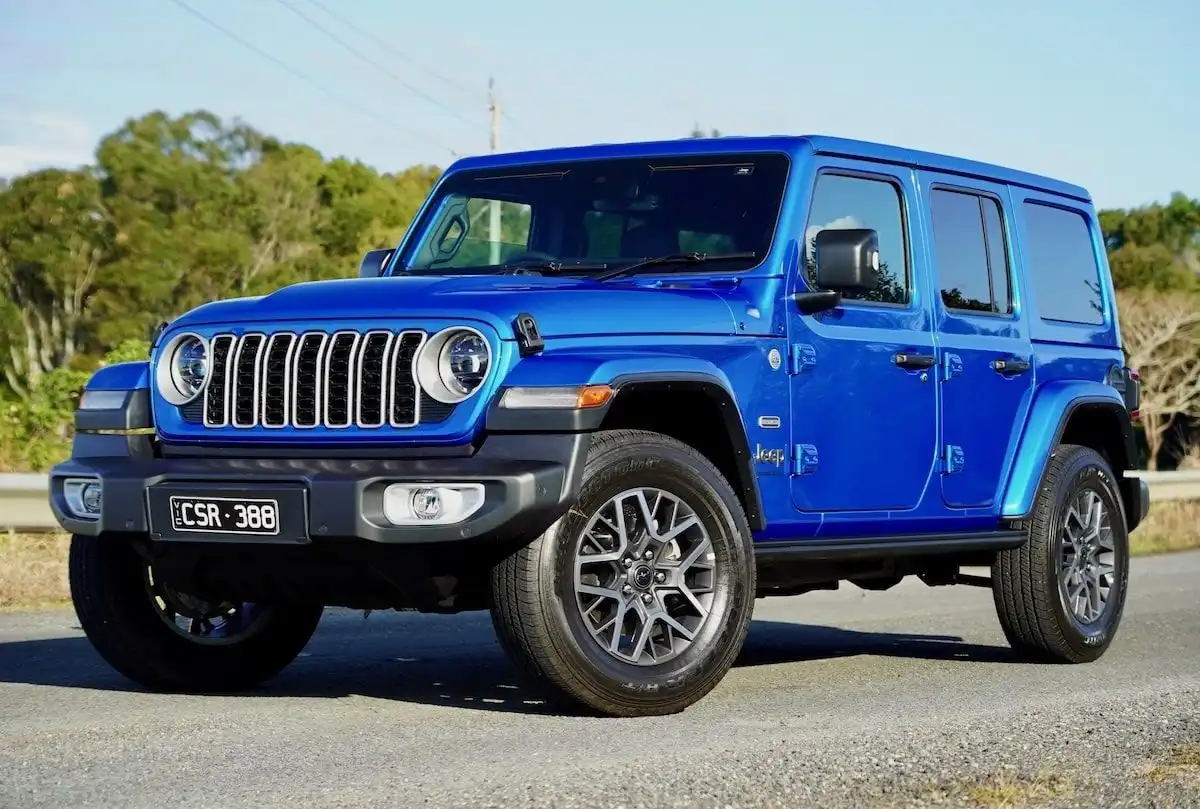
A major upgrade for the MY24 Wrangler range is the adoption of a new, 2.0-litre turbocharged four-cylinder petrol engine that replaces the outgoing V6 petrol.
It’s a meaty little four-pot that offers slightly less power - 200kW down from 209kW - though torque figures have grown a notable 53Nm, totalling 400Nm, which is channelled to the wheels via an eight-speed automatic transmission.
While die-hards may be a little disheartened, on the road the differences go in favour of the new 2.0-litre turbo petrol, which offers a wider spread of torque, particularly low down in the rev range.
The end result is decent acceleration off the line and more linear acceleration as you pick up pace and push through the gears, buoyed by significant fuel economy gains.
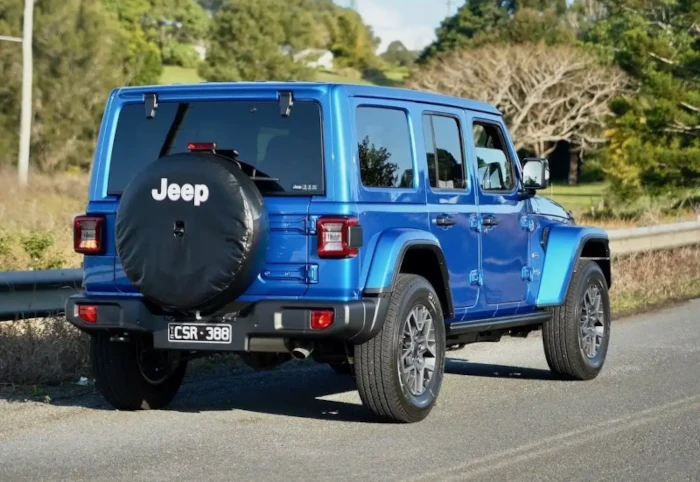
Around town, the Wrangler proves itself a surprisingly accommodating daily driver - largely thanks to the featherweight steering rack and decent turning circle that means it's not too cumbersome in tight quarters.
It’s certainly large but doesn’t have the same XXL footprint as a fully-fledged 4x4 wagon, which makes it easier to park around town, too.
Pick up the pace and you’ll notice that the Wrangler rides in a particularly bouncy manner.
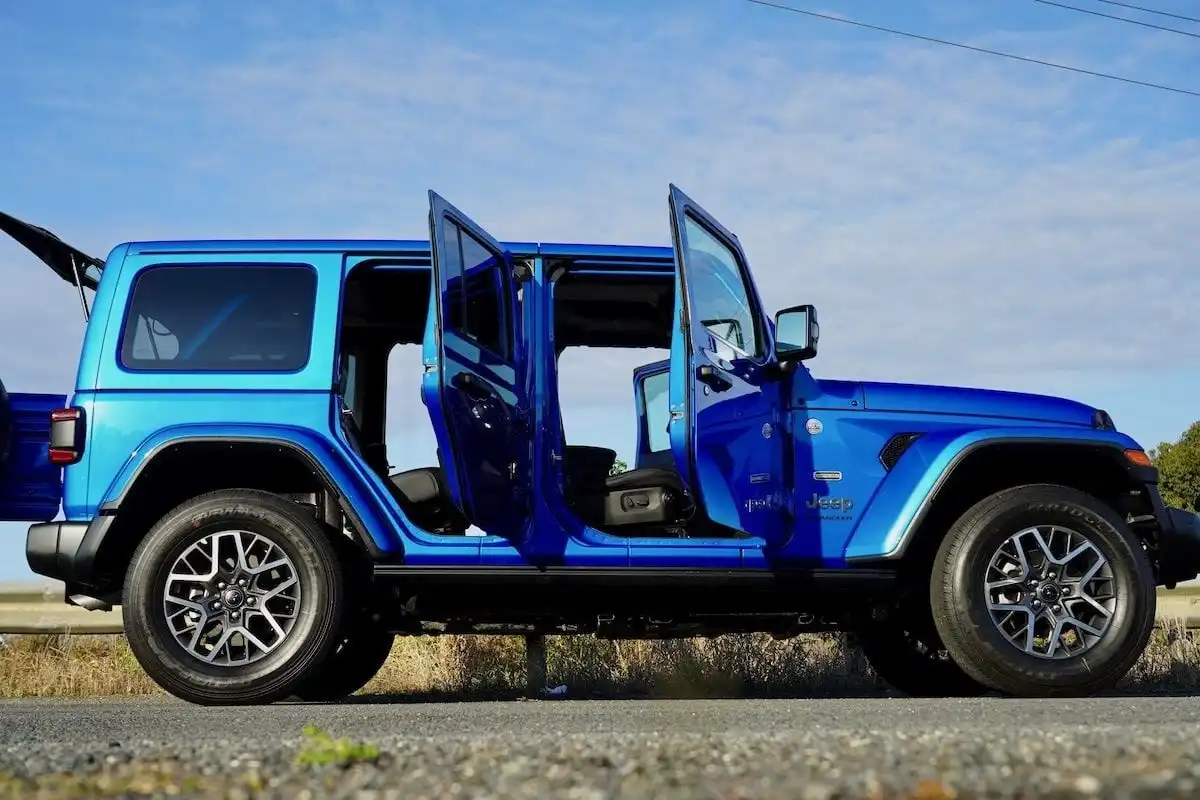
At lower speeds, this works well to iron out bumps and potholes on the road while keeping things comfortable, but as you pick up the pace, it becomes a little unsettling.
Jeep has done well to make it more civilised, though the Wrangler still feels as though the rear needs to be tied down to add confidence behind the wheel.
Couple that with its incredibly light, if not vague steering feel, and the Wrangler is still showing its militaristic, off-road bones while driving on the sealed stuff.
That said, on the highway, the Wrangler is pretty well-mannered, with easy overtaking from the 400Nm of torque on tap, though the fuzzy steering means it’s easy to drift between the lane markers.
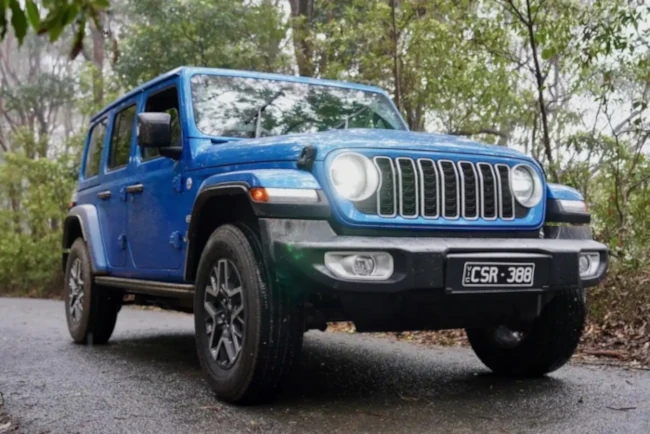
There’s also some noticeable wind noise from the large, square side mirrors, but it’s easy to drown that out with the powerful Alpine sound system.
All up, the driving experience on offer in the latest Wrangler range has certainly come a long way, but it’s worth noting that its go-anywhere abilities do come with some on-road quirks.
Is the Jeep Wrangler Overland a Great Off-Roader?
For all its foibles on the road, the Wrangler remains an immensely tough and confident off-road package in a nod to its original, military design.
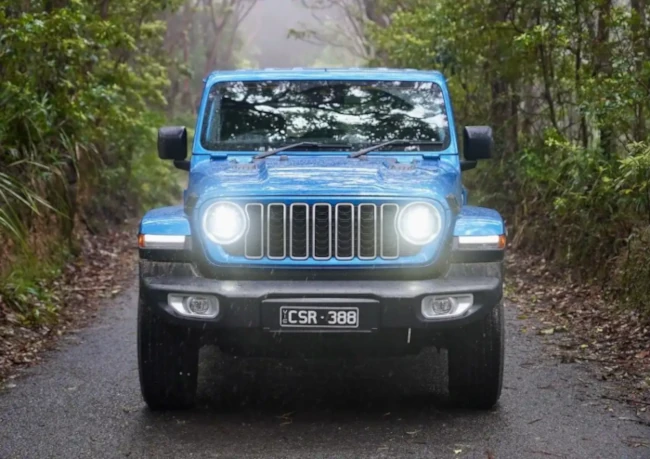
Underneath, the Wrangler Overland picks up an upgraded Dana M220 axle which adds even more strength, improved ground clearance and more accommodation for both larger tyres and further rear differential upgrades.
Combine that with a hefty amount of ground clearance, Jeep’s Select-Trac four-wheel drive system and a low-range transfer case to help you get out of trouble and the Wrangler is a super-capable off-roader.
Jeep’s Selec-Trac 4x4 system allows you to change the power delivery from two-wheel to four-wheel drive on the move, while the 4H and 4A settings allow for permanent four-wheel-drive on sealed roads.
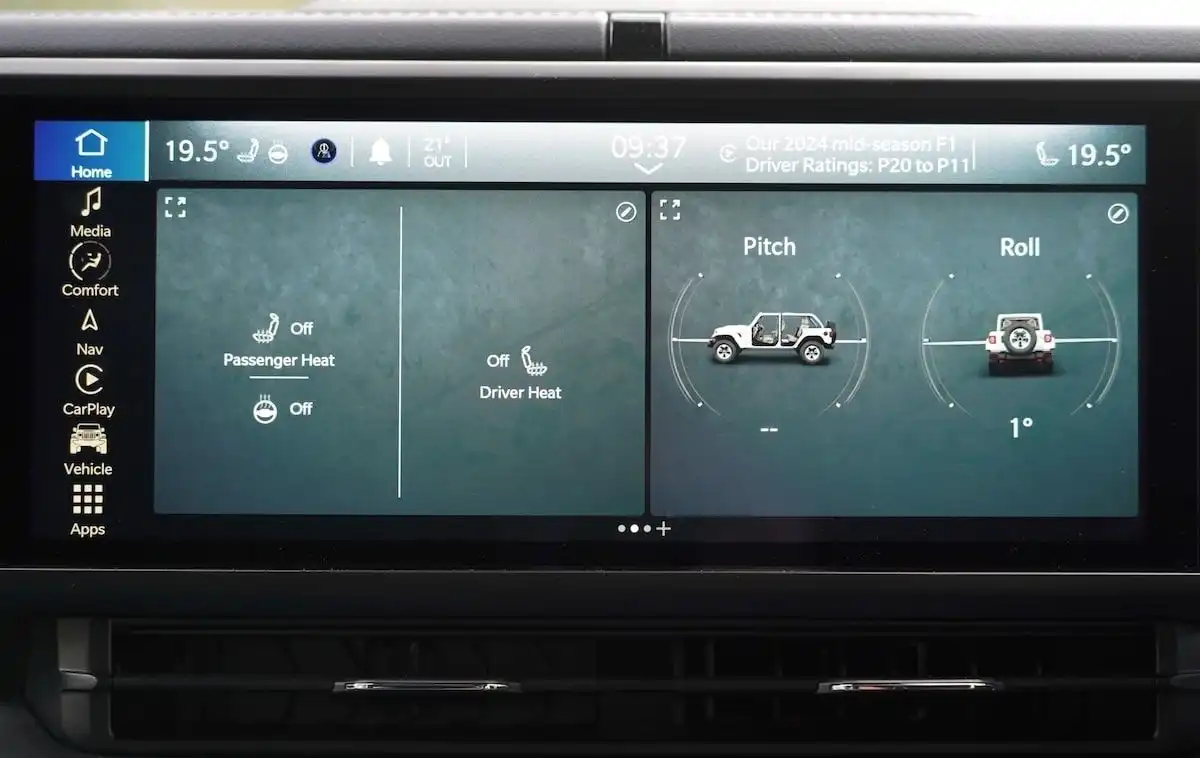
One thing to note, though, is that the Overland here misses out on the trick Rock-Trac 4x4 system, a front sway bar disconnect and the all-important electronic locking front & rear differentials that are reserved for the Wrangler Rubicon.
As a result, if you’re serious about hitting the trails, it may be worth checking out the similarly-priced Wrangler Rubicon 2-Door or paying extra for the four-door Wrangler Rubicon thanks to the significant off-road hardware upgrades.
-
Ground Clearance: 245mm
-
Wading Depth: 760mm
-
Approach Angle: 41.8 degrees
-
Departure Angle: 36.1 degrees
-
Breakover Angle: 21.0 degrees
-
Braked Towing Capacity: 2,495kg
Is the Jeep Wrangler Overland Fuel Efficient?
Jeep’s implementation of a turbocharged four-cylinder engine offers some significant fuel efficiency gains over the outgoing Pentastar six-cylinder, though it’s not exactly a responsible drinker.
Jeep claims the Wrangler Overland sips 9.2L per 100km on a combined cycle, though we had trouble replicating these figures in the real world.
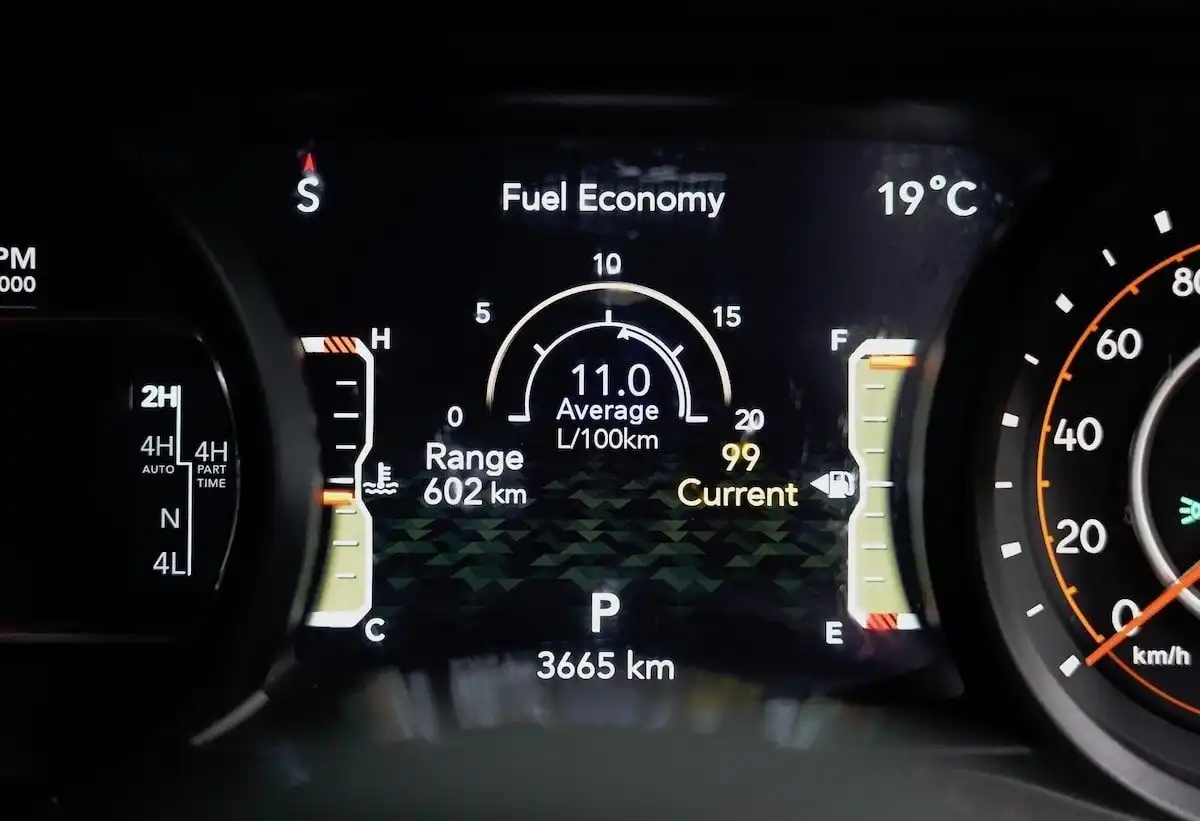
In fact, we drove with an intentionally light throttle foot and kept the Wrangler in the 2H setting to get the most efficient figures possible, which still resulted in numbers around the 10.4L per 100km mark.
Utilising Jeep’s four-wheel drive system means that you’re likely to see these figures go north of the 12L per 100km- significantly north if you’re bumbling around town.
-
Jeep Wrangler Combined Cycle Fuel Consumption: 9.2L per 100km (claimed)
-
Jeep Wrangler Combined Cycle Fuel Consumption: 10.8L per 100km (tested)
-
Jeep Wrangler City Fuel Consumption: 11.7L per 100km
-
Jeep Wrangler Overland Highway Fuel Consumption: 7.7L per 100km
Is the Jeep Wrangler Overland Practical and Spacious?
Step inside and the Jeep Wrangler greets you with a unique interior design that over-flows with an all-American charm.
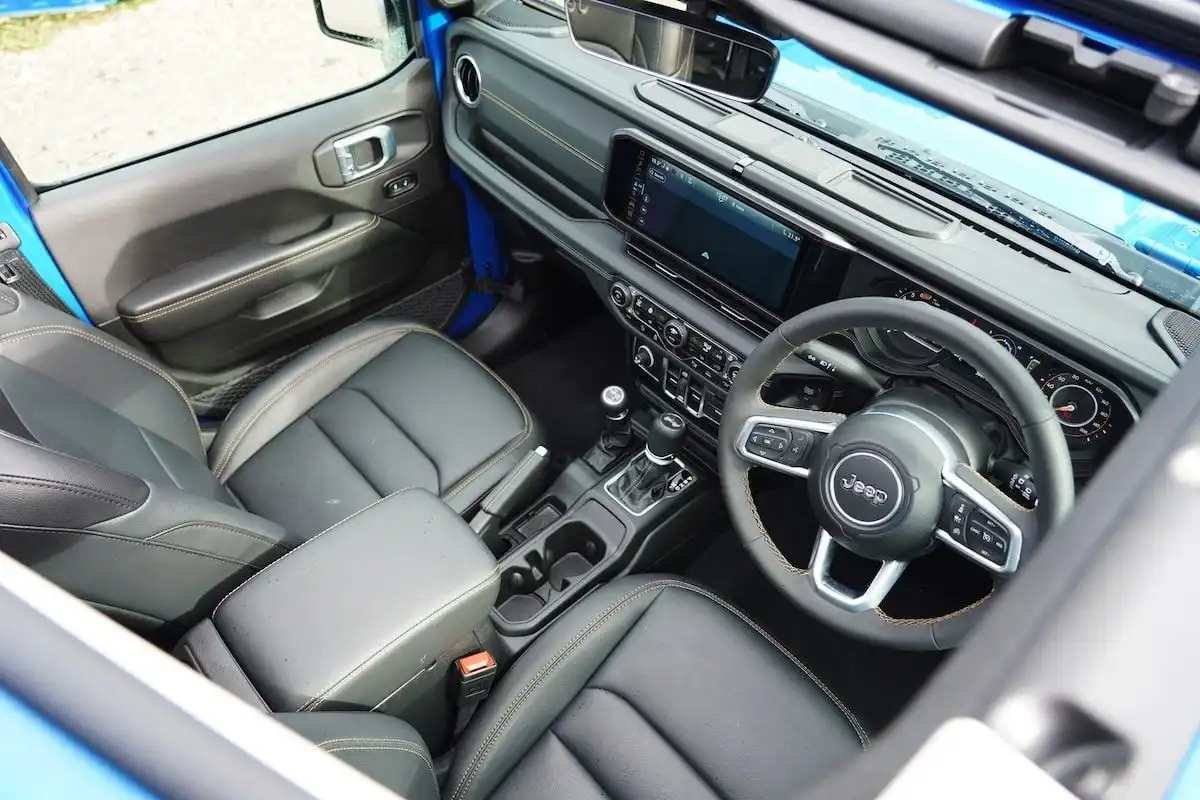
Headroom in the front of the cabin is great, meaning tall drivers won’t have a problem getting comfortable in the Wrangler’s cockpit, even with the lofty driving position that adds to confidence behind the wheel.
Forward visibility is decent thanks to the Wrangler’s height, though the windshield is a bit compact and boxy.
This is countered by excellent side and rear visibility thanks to the large windows and boxy design that makes it feel like a glasshouse on wheels - albeit with a chunky roll-cage inside the cabin.
The leather-wrapped steering wheel feels great, though the analogue dials are beginning to show some signs of the Wrangler’s age.
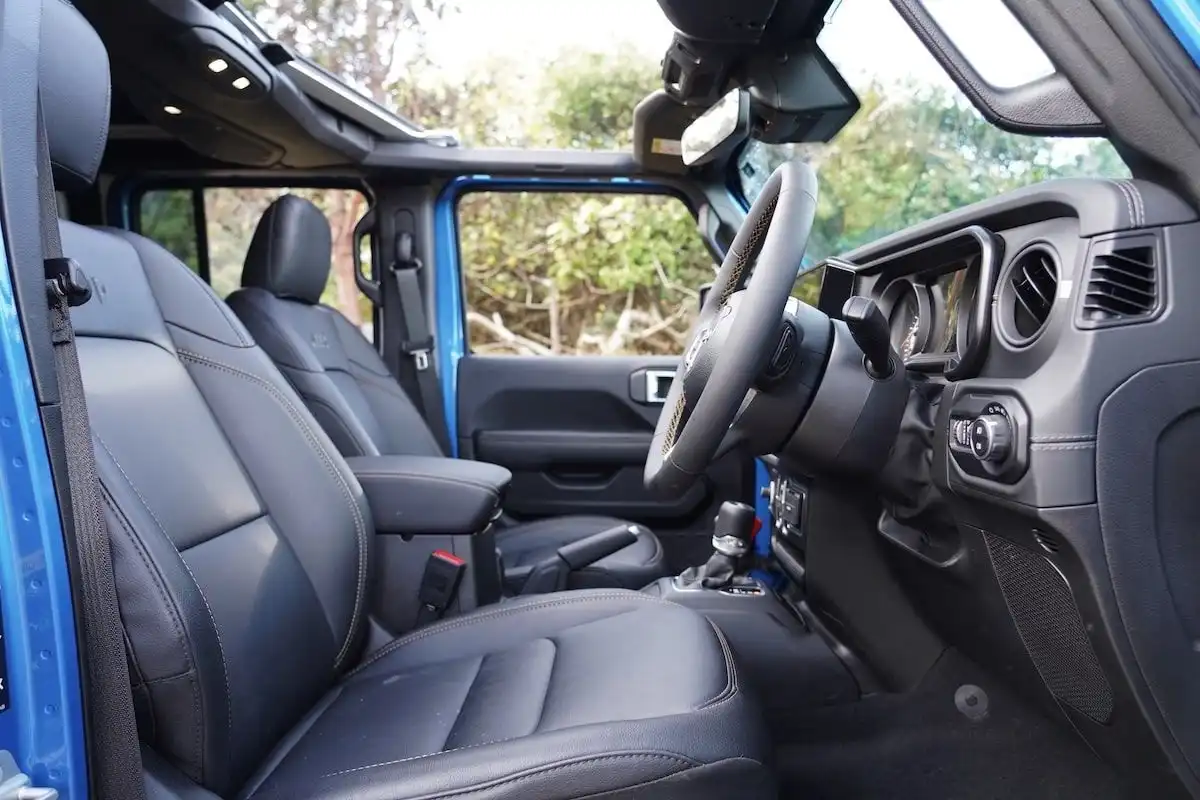
That said, the significant infotainment system upgrade helps to keep things sharp up front, which sits atop a crowd of physical buttons and dials for the media, climate controls and even the window operations - since the doors come off.
Look up and there Wrangler’s removable roof mechanisms certainly don’t look great, but they are effortless to operate…. More on that later in the review.
Specific to the Wrangler Overland variant are premium touches like the upgraded McKinley leather upholstery with 12-way power-adjustable front seats and lumbar support, which are a nice upgrade over the base model’s cloth upholstery.
For such a large, bulky cabin, storage options are actually quite limited.
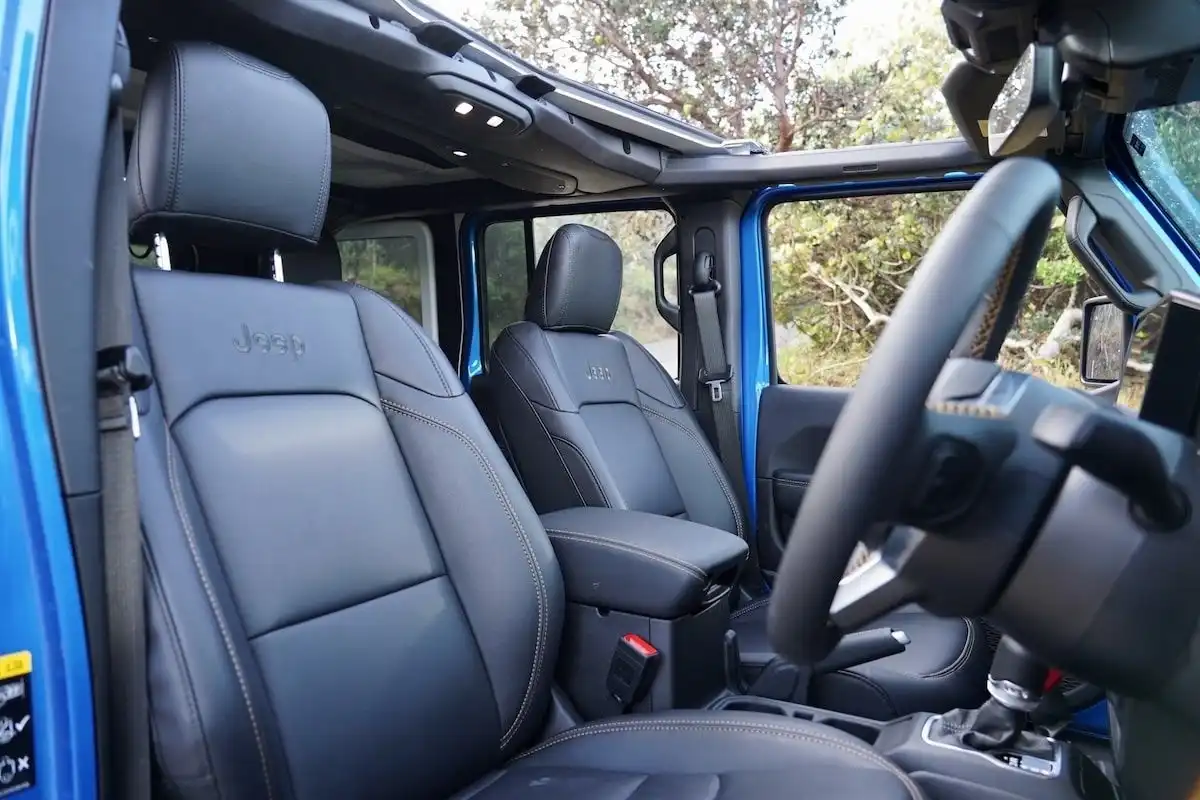
In total, you’ve got an extremely narrow tray for smartphones behind the gear lever, a pair of cupholders, a two-tiered armrest with storage inside and netted door pockets.
On the road, the latest Wrangler’s build quality feels solid, with no noticeable creaks inside the cabin, which is mighty impressive for a package you can pull apart like Lego - though it’s worth noting our review vehicle only had 3,000kms on the clock.
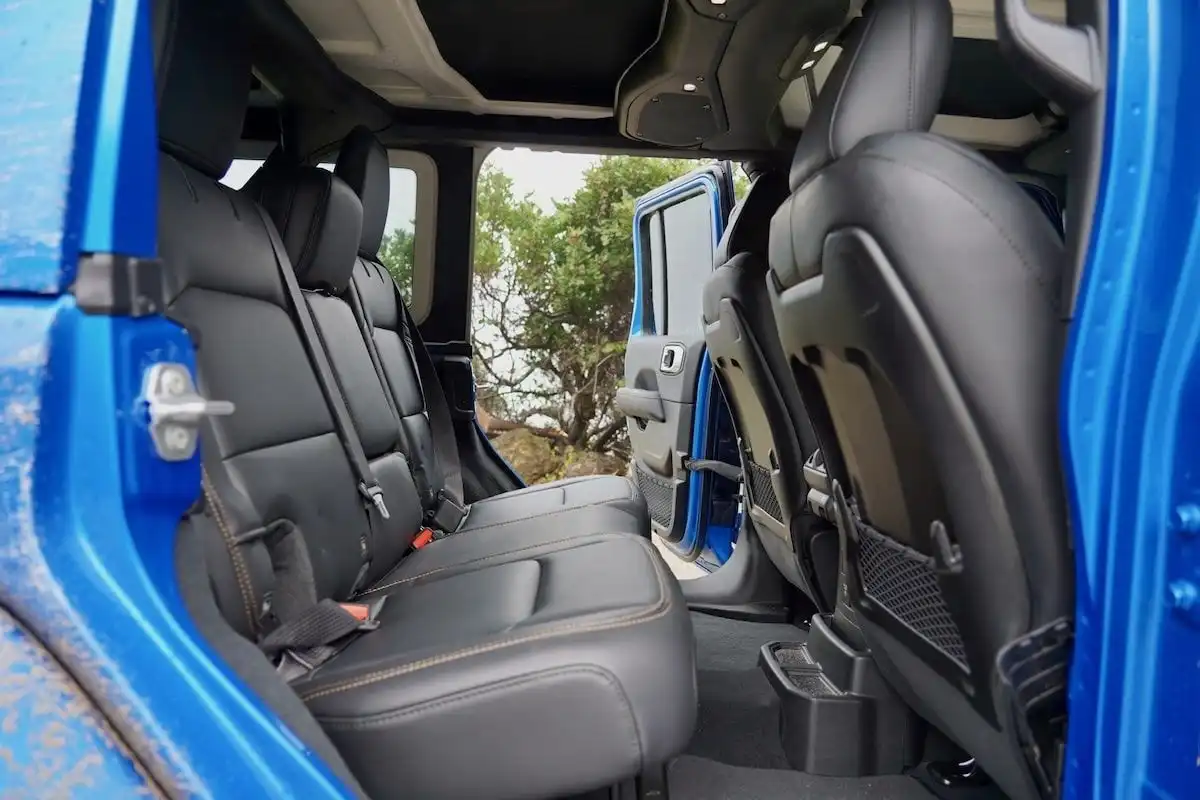
Moving to the second row, the Wrangler proves itself as a particularly family-friendly SUV package, offering a healthy amount of headroom and great legroom, even sitting behind a tall driver.
The Wrangler’s roll cage is more pronounced in the rear of the cabin, but it doesn’t eat away at headroom too much, while amenities like air vents, a pair of USB ports and netted storage on offer in the second row.
For the parents out there, the Jeep Wrangler Overland receives two pairs of ISOFIX anchors on the rear bench, with top tether mounts on the seatback for a variety of forward and rear-facing child seats.
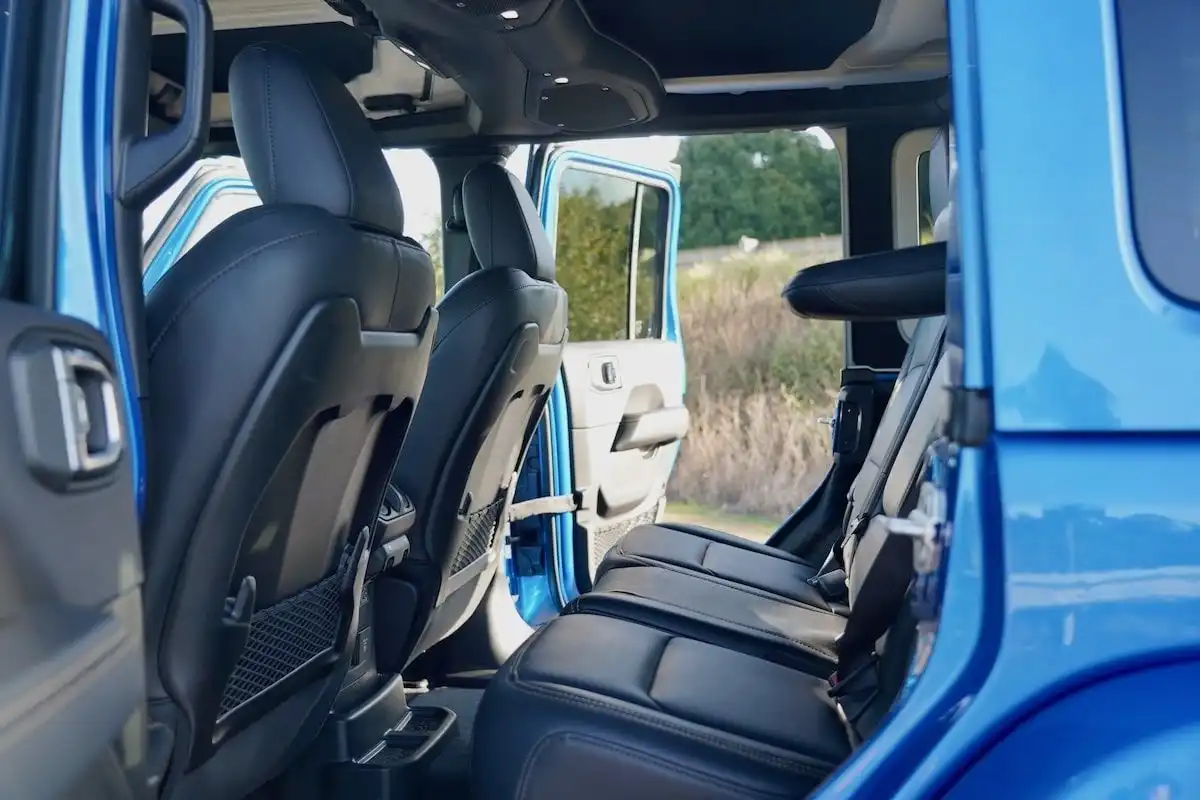
How Big is the Jeep Wrangler Overland’s Boot?
As an adventure-ready 4x4, the Jeep Wrangler offers a healthy amount of storage in the boot.
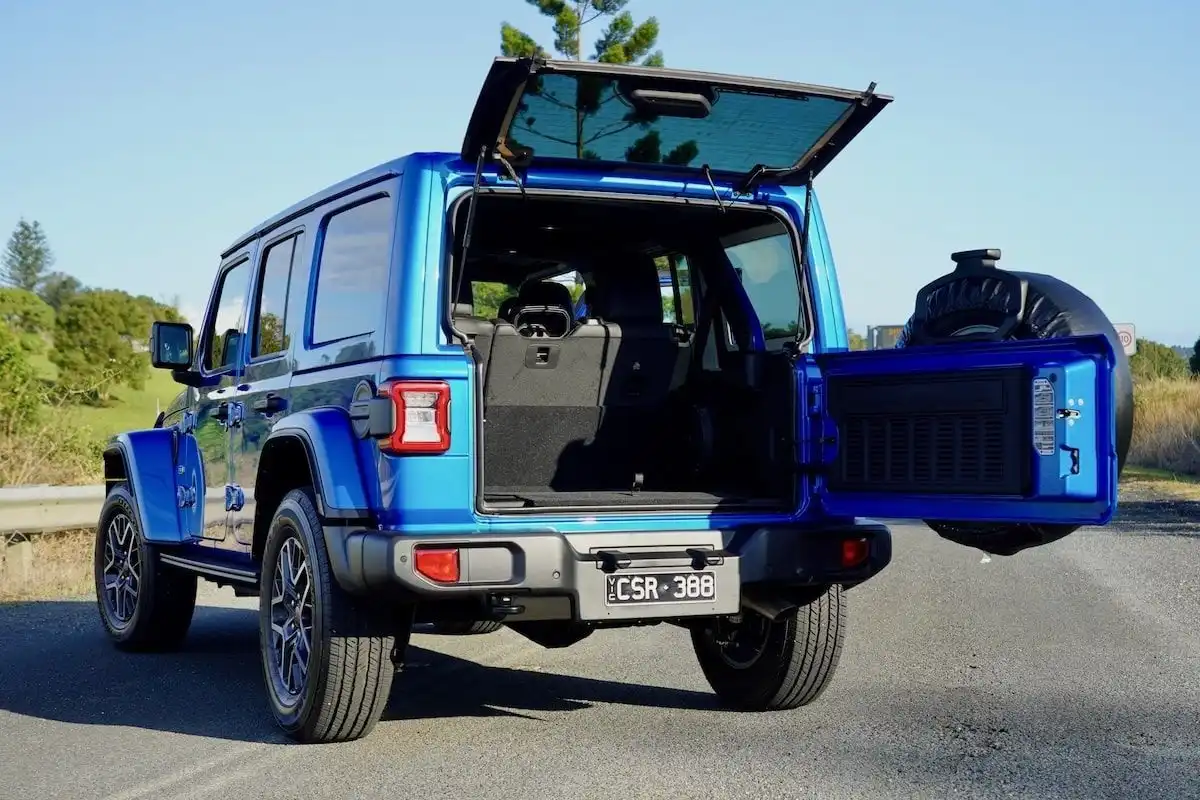
The design itself isn’t the widest, though it is deep and particularly tall thanks to the Wrangler’s squared-off dimensions.
In total, the Jeep Wrangler Overland four-door has a boot measuring a very decent 987L.
Fold down the rear seats and you’ll unlock a total of 2,050L worth of boot space when it’s time to lug around sports gear, surfboards, a run to the airport or a haul from the hardware store.
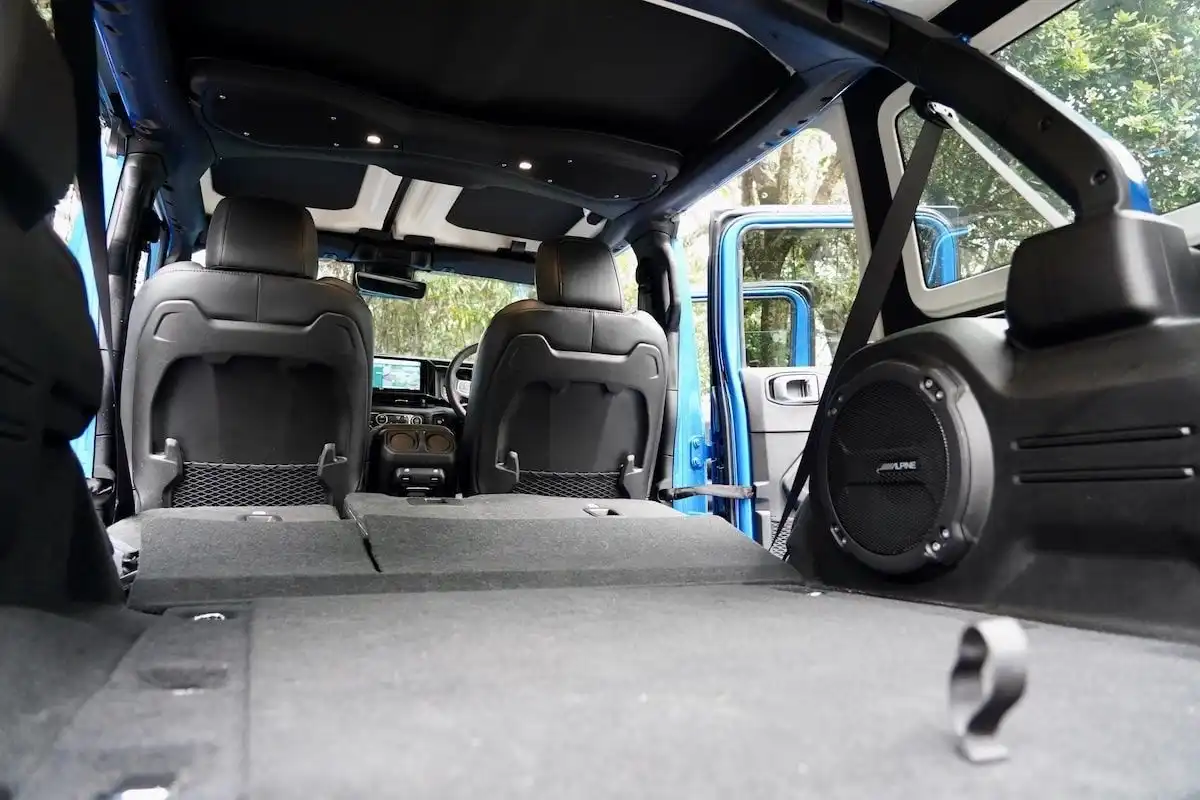
The boot opens in a split design, with the lower, metal boot lid opening on a hinge while the glass rear windshield folds up above your head and helps to keep you out of the elements while you’re unloading the boot or changing out of a wetsuit.
There’s also some under-floor storage and a neat place to store each of the screws that are removed while taking the Wrangler’s doors off.
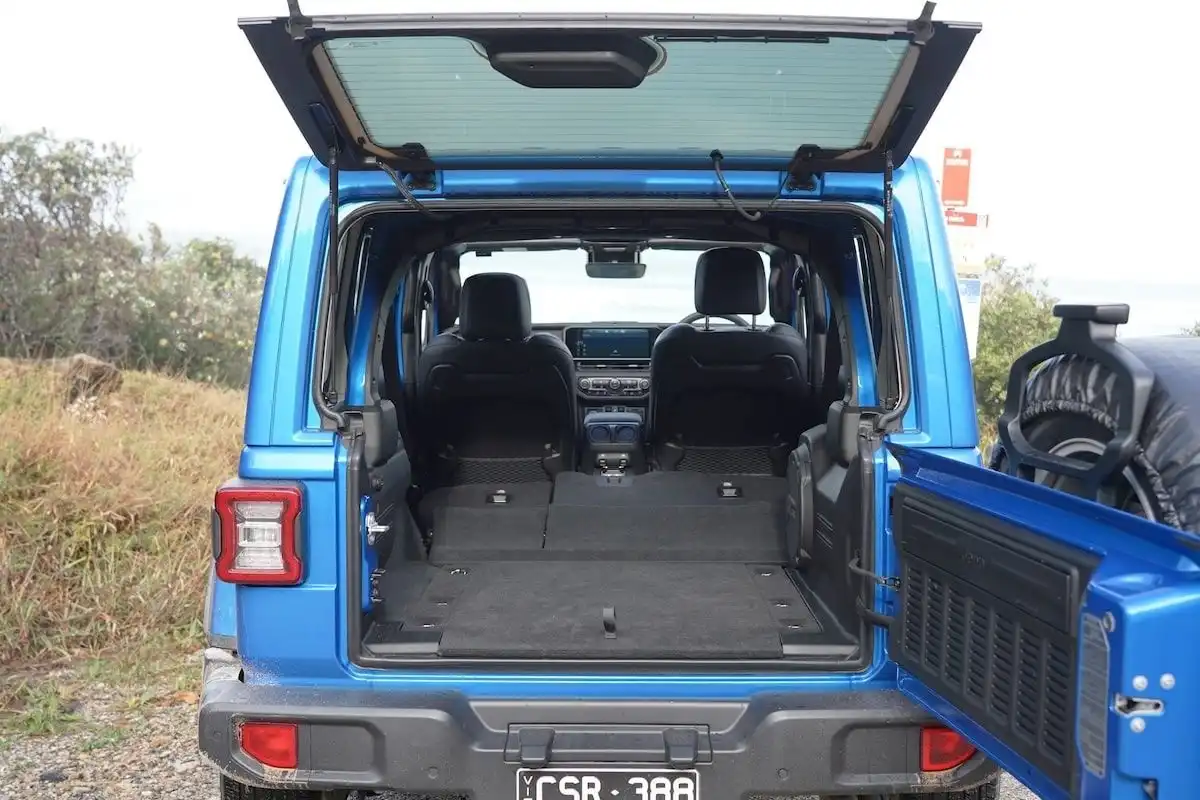
Is it Easy to Remove the Jeep Wrangler’s Doors and Roof?
It’s incredibly easy to tear the Wrangler’s roof and doors off, resulting in one of the most unique cabins with infinite views and a one-of-a-kind Jurassic Park vibe.
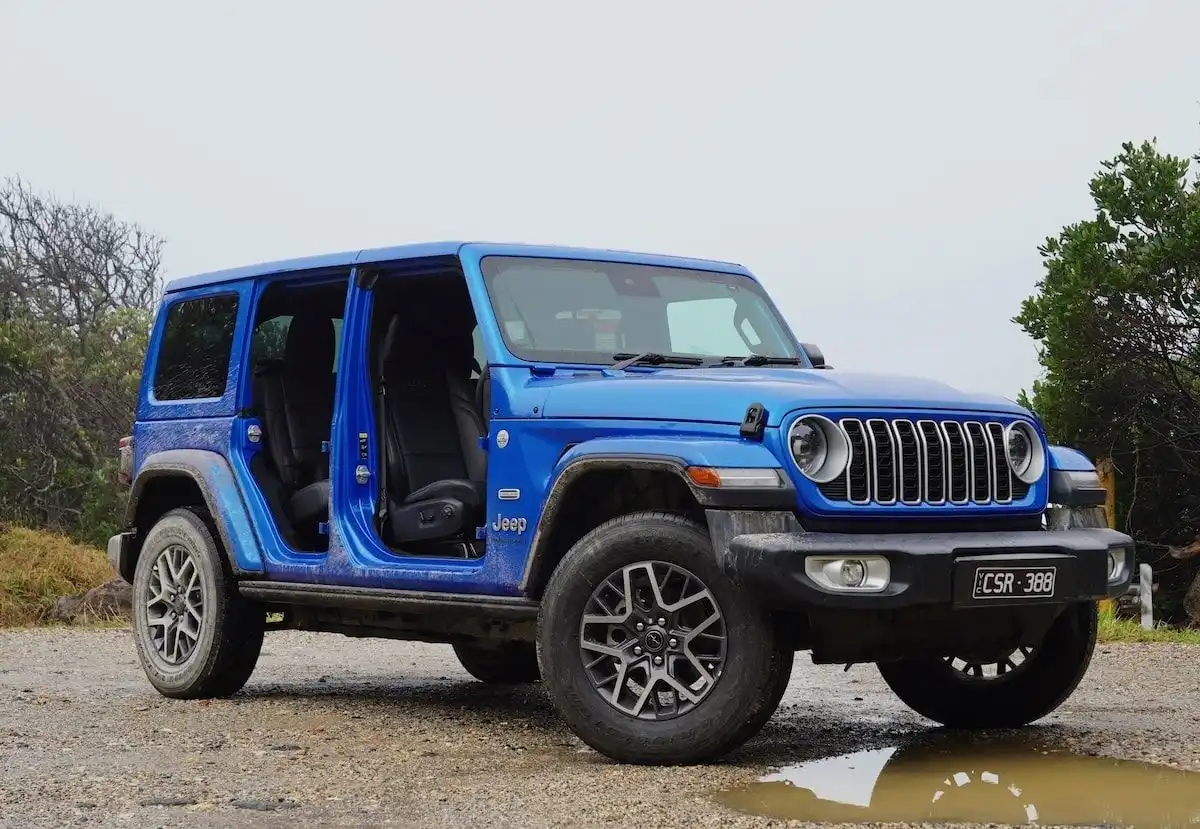
To remove the roof, simply flick the three, black plastic panel holders to the side, and unlock the metal handle above each wind shade.
When that’s done, you’re able to lift both of the roof panels out, starting with the left-hand side of the cabin and installing that last to ensure the waterproofing is in the right place.
To remove the Wrangler’s doors, grab the Jeep tool hit and you’ll need both of the included hex screws.
Begin with rolling down the windows to avoid shattering the glass, then remove the plastic trim housing the hinges and access to the electronics.
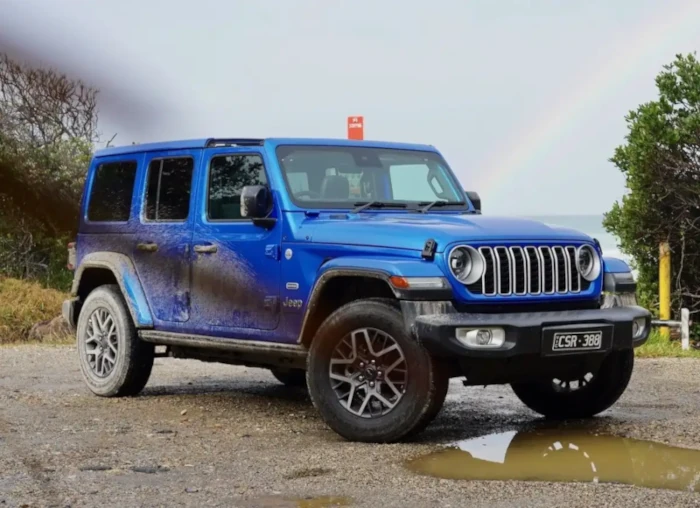
Remove the hex screws holding the door hinge in place, then remove each of the four hex screws holding the doors on the outside hinges and you’re away.
It’s worth mentioning, though, that if you’re planning on removing the Jeep Wrangler’s doors and roof panels that you’ll need to stick to a private road - it’s illegal to drive without doors and the roof on the public roads.
Is the Jeep Wrangler Safe?
Jeep has given the Wrangler some much-needed safety upgrades in years past, with the latest Wrangler range picking up new first and second-row curtain airbags for 2024.
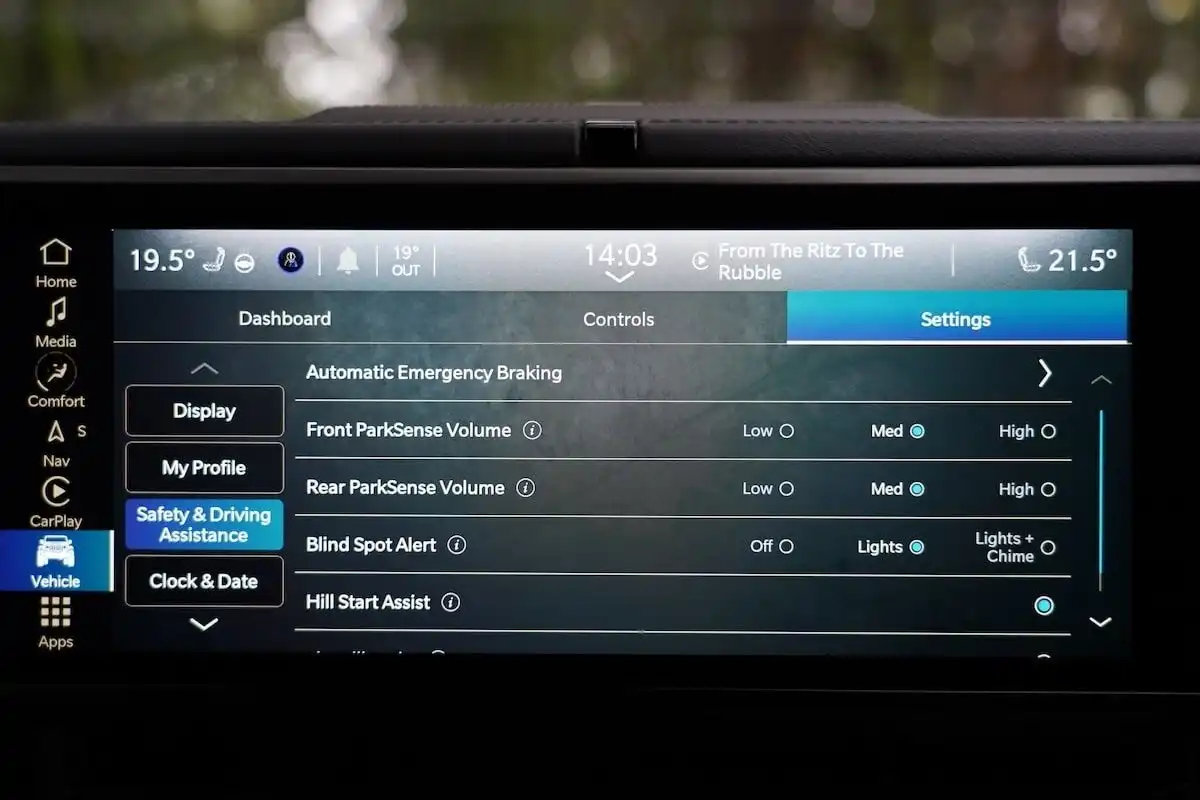
These are in addition to an autonomous emergency braking system, blind-spot monitoring, adaptive cruise control a rear-view camera with front & rear parking sensors and rear cross-traffic alerts.
In short, the Wrangler covers the fundamentals of active safety gear, though we think the addition of a surround-view monitor or the off-road Trailcam would help to sweeten the deal, considering the Overland’s lofty price tag.
Does the Jeep Wrangler Overland Have an ANCAP Safety Rating?
The current Jeep Wrangler range wears a three-star ANCAP safety rating from testing conducted in 2019. In those tests, the Wrangler scored the following marks.
-
Adult Occupant Protection: 60%
-
Child Occupant Protection: 80%
-
Vulnerable Road User Protection: 49%
-
Safety Assist: 51%
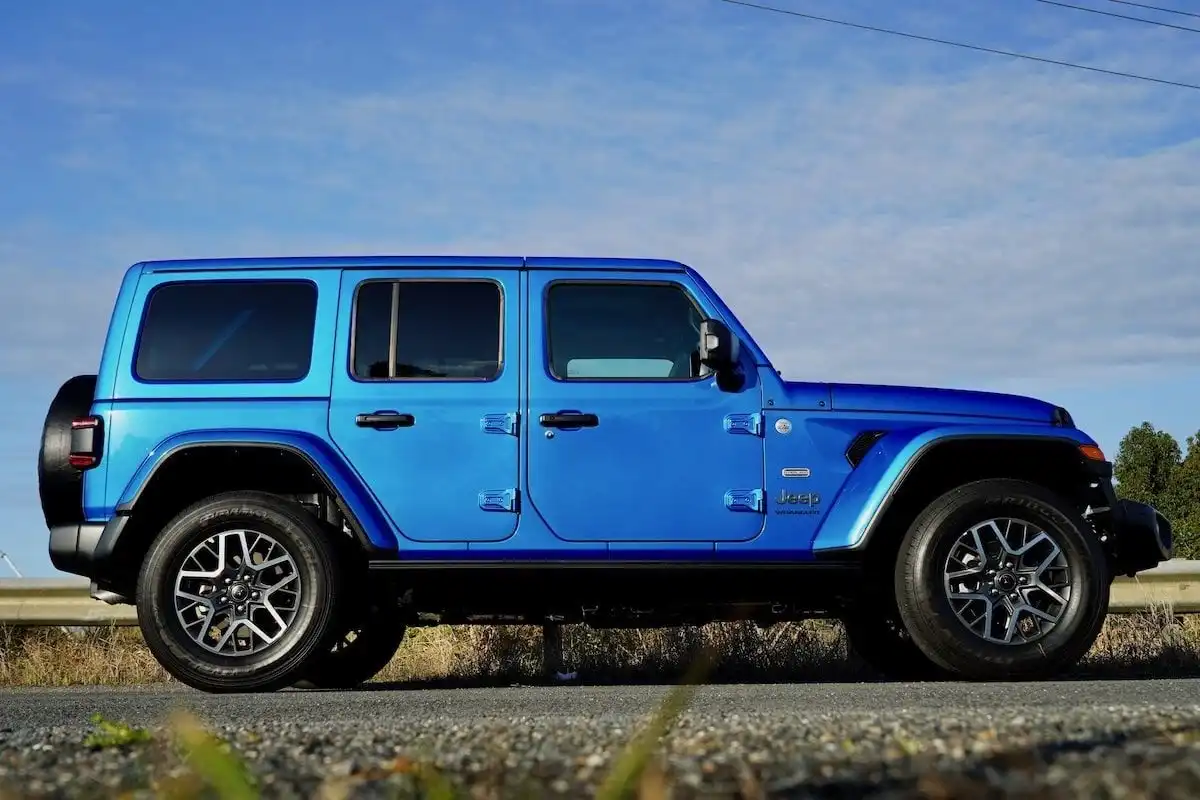
It’s worth noting that Jeep has added several active safety features to the Wrangler since its ANCAP tests, with the latest inclusion being the curtain airbags for the current MY24 range.
What Warranty Does the Jeep Wrangler Overland Come With?
Jeep offers the MY24 Wrangler lineup with a five-year/100,000-kilometre warranty.
While kilometre coverage is limited, Jeep aims to sweeten the deal for buyers with a lifetime of roadside assistance, as well as five capped-price services.
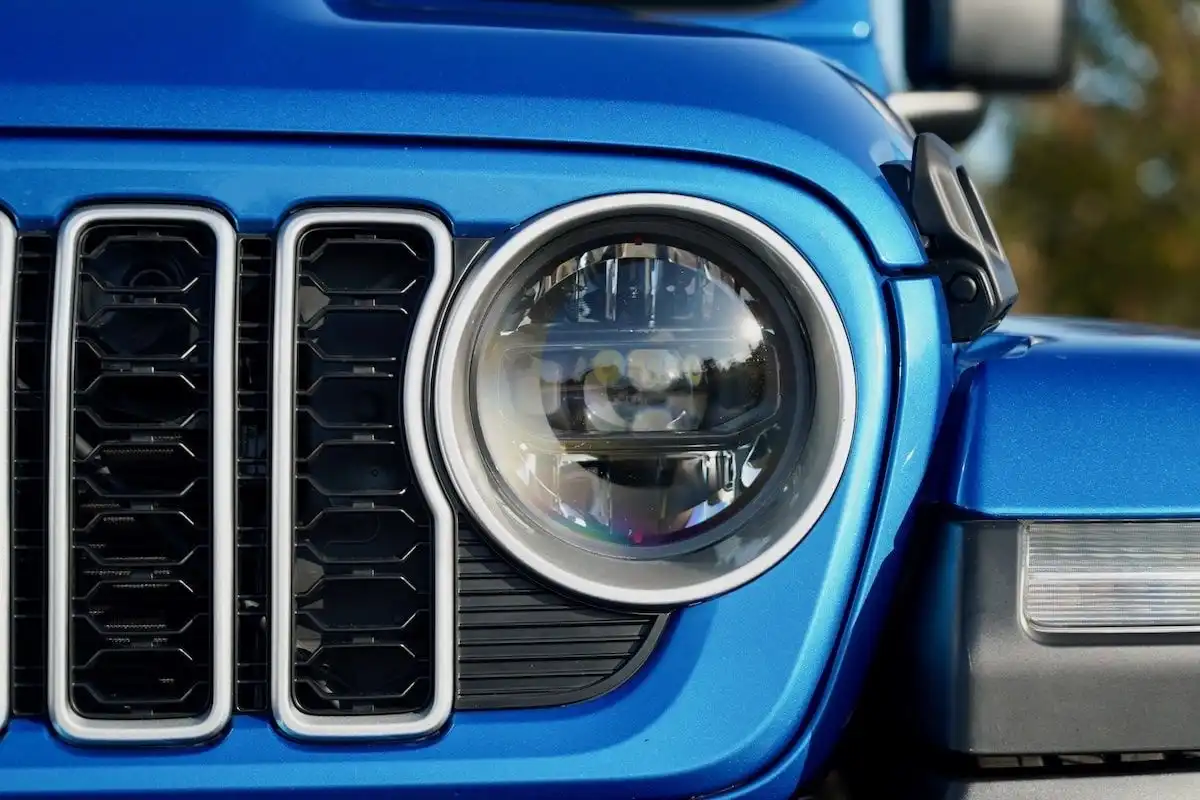
These capped-price services are priced at $399 a piece, bringing the total of five services - or 60,000km - to $1,995.
Service intervals for the MY24 Wrangler range stand at a relatively short 12 months or 12,000-kilometres, whichever elapses first.
Our Verdict: Is the Jeep Wrangler Unlimited Overland Worth it?
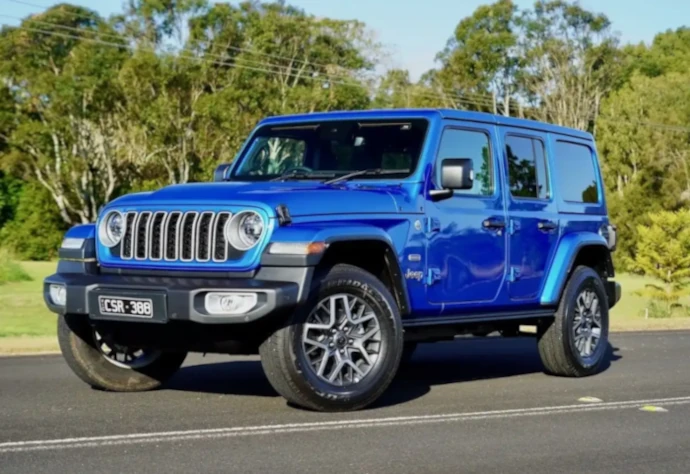
There’s no denying the allure of the Wrangler’s adventurous abilities, bolstered by the incredible novelty factor of the removable roof and doors - but there’s no escaping its sheer price tags in the face of tough competitors.
At the end of the day, you’re paying for what’s underneath the Jeep Wrangler - and where it can go.
This means that certain types of buyers, those looking for a mighty adventure, are able to extract more value out of the Jeep Wrangler than others… it’s a use-it-or-lose-it type of equation.
While the Wrangler is arguably the benchmark for off-roading in the segment - its design as primarily an off-roader-turned-road car does come at the price of everyday driving refinement.
That said, the new four-pot engine with increased torque and better fuel economy does help to sweeten the deal, with the new infotainment tech making it more competitive in the current landscape.
For those that can’t help but fight its uniquely brash, all-American charm and go-anywhere abilities, we’d recommend taking a close look at either saving some money with the entry-level Wrangler S or side-step to the Rubicon which picks up even more off-road hardware.
If you’re looking to upgrade to a new car, be sure to reach out to one of our car-buying experts who can help find you the best possible price.
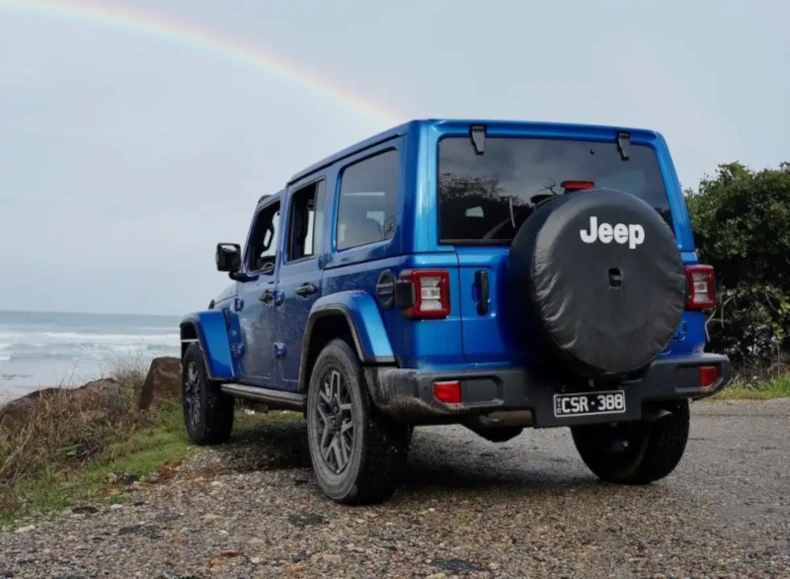
Five Jeep Wrangler Overland Specs You Need to Know
-
Five-year/100,000-kilometre warranty
-
Lifetime roadside assistance, five capped-price services
-
2.0-litre turbocharged four-cylinder petrol, Selec-Trac 4x4 system with low-range
-
9.2L per 100km combined cycle fuel economy figures
-
987L boot space expands to 2,050L with rear seats folded
Get in touch with one of our Car Buying Specialists today.
Request a quote